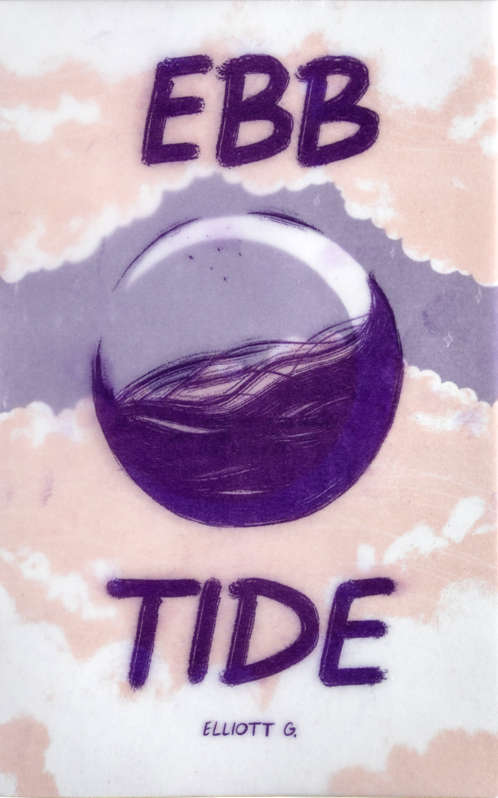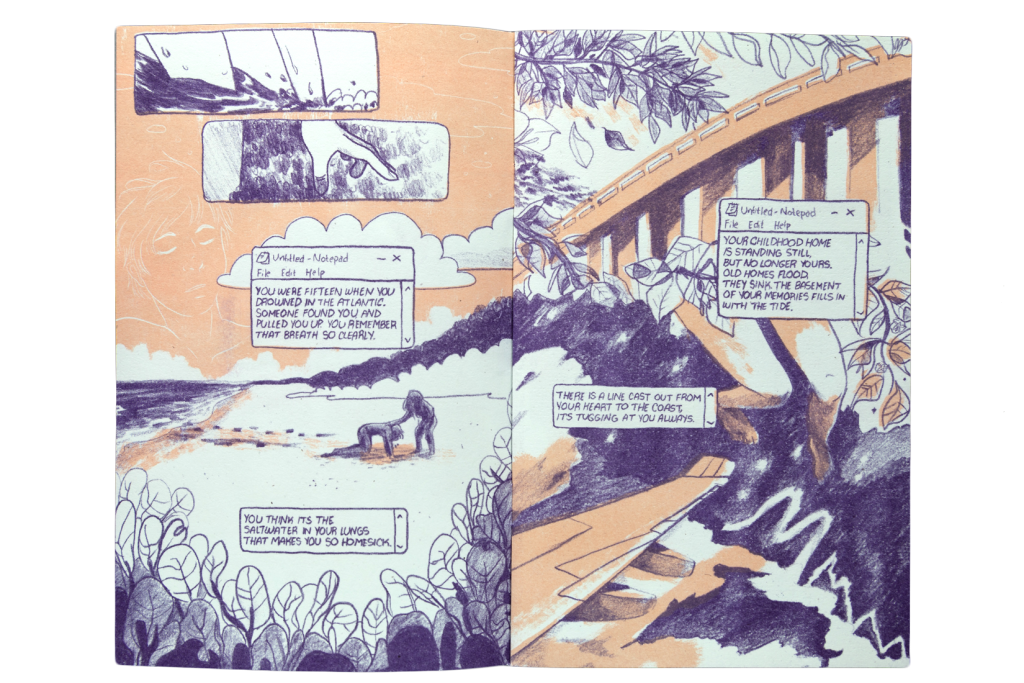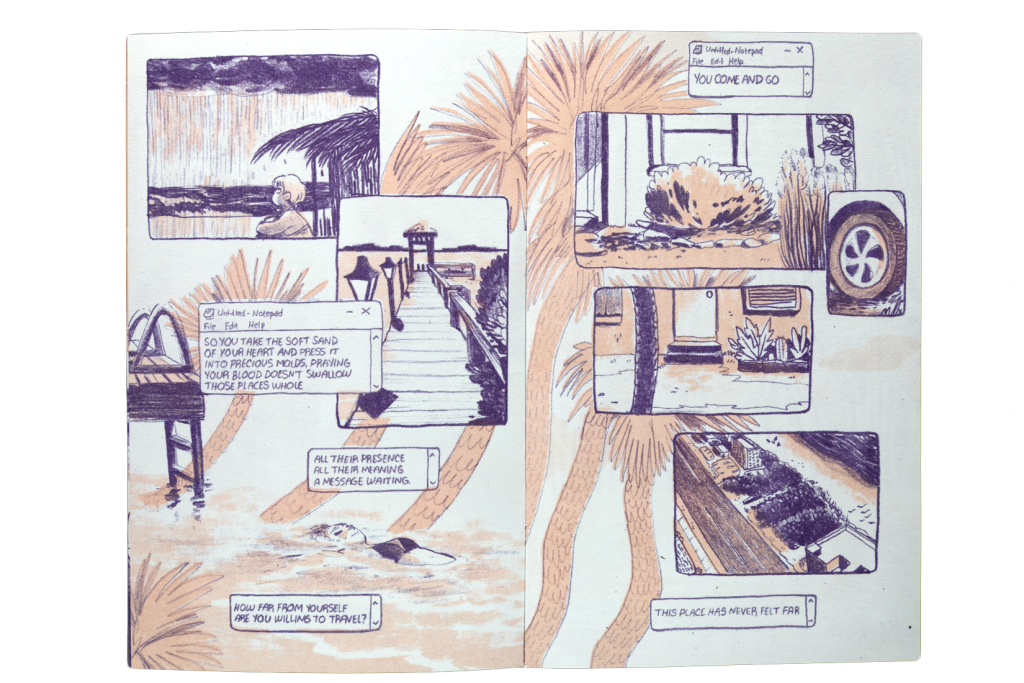
CW: domestic violence, rape, suicidal ideation
The world exists in a liminal space, a sort of purgatory of reality. The COVID-19 pandemic has kept us away from families, friends, and lovers. As we enter the traditional Western holiday seasons, that separation becomes more palpable. The pandemic has separated us from the things that we enjoy, yes, but more than that, and more still. We are hoping for normal to return, whatever normal means. I’m not sure I know what it means. I’m not sure I’ve known for a long time.
Elliott G.’s book Ebb Tide was published in what I am now calling “the time before the plague.” There are these little artifacts of that time that float around my house. The chasm of the before and the now seems frighteningly large. But over the last few months, I have been trying, however futile it may seem, to build a bridge that will cross that chasm.
Ebb Tide is also trying to bridge a chasm, a chasm created by sexual violence and abuse. A work of comics poetry that debuted from Diskette Press for TCAF 2019, Ebb Tide is partly an autobiographical naming of abuse that Elliott G. has endured, and it is partly a poetic love letter to the person that Elliott was and the person that they are now becoming.

Ebb Tide introduces itself to the reader with a slight paradox. The opening line, nestled in the curve of a crescent moon, reads “this is a love letter to myself, but maybe you can find love in it too.” Every artist has different reasons to create — to entertain, to express themselves, to stand in for therapy they can’t afford — the possibilities are endless. The comics form is one of the most commercial, most disposable ways that an audience can obtain art. Generally, comics are manufactured at as low a price as possible so that as many people as possible can obtain them, the “low-brow media” of choice. For Ebb Tide, the purpose of the form stands in stark contrast to the stated purpose of the work. The juxtaposition of these two opposing forces is the bedrock on which Elliott G. builds Ebb Tide.
Perhaps this juxtaposition is the nature of all comics poetry, a hybrid grown from the combination of forms that we have spent numerous hours examining here at SOLRAD. But in Ebb Tide, it feels even more pronounced given the subject matter of the book. Elliott G. explores the nature of their relationships with home, earth, water, and air, as well as their relationship to themselves in light of significant trauma, both emotional and physical.
You get the sense reading Ebb Tide that Elliott G. is not just examining the past, but ruminating on it; Ebb Tide is full of discreet images paired with an overwhelming rush of emotion, blended on the page with inventive use of panel and background that speaks of understanding the conventions of comics-making and the willful choice to ignore them. The form of Ebb Tide allows Elliott G. to explore the horror of domestic and sexual violence in a way that is both harrowing and oblique, frightening and indirect. Alongside the distinct and powerful naming of transgressions is a similarly powerful self-profession — Elliott G. speaks into being their bright light, love, and the human capacity for personal change.
The power of the book comes not just from the topic, but from the way Elliott G. uses color and form to explore it. Lush purple and muted pink bisque overlap beautifully, and the entire book is constructed with thoughtfulness and care. Concrete images of buildings, plants, wildlife, and oceans give way to abstracted forms and back again. The mark-making of Ebb Tide keeps the reader in a contemplative and surreal headspace, allowing the narrative of the work to have a deeper impact.

One of the more fascinating constructs in Ebb Tide is Elliott G.’s use of the Notepad window. Most people have seen or used Notepad software on a computer using the Windows operating system — it’s a low-fidelity word processor where things stay for a minute and then disappear. It doesn’t handle the traditional forms of writing well. It fights against formatting. The software is at least 35 years old. Using it means embracing the fickle and the impermanent. How perfect a visual corollary to the human thought, itself fickle and impermanent, which makes up every waking moment of our lives? If anything presents itself to the reader head-on, it is Elliott G.’s explicit use of the Notepad textbox as a shorthand for their own thought, an effect that feels like a spilling over of the real into the dreamed, of the mental into the physical. In this way, Ebb Tide feels like a book that gives form to the interspace, the transition, the moving-on.
Ebb Tide further explores this space with a thoroughly spiritual construction. If Ebb Tide is a comics poem, then it is also a comics prayer. Not necessarily a prayer to a God, per se, but rather to the great Love that exists in all things, especially in the self and the understanding of the relationship between self and other, the relationship between the past-self and the now-self. It is significant and potent that the only spoken words in the entire book are of two people embracing, representing past and current visions of self. “I do it for love,” the current self says, and the impact of those words reveals in a more visceral way what Elliot G. has already told us at the outset of the book. Repetition is the formal heart of Ebb Tide, just like the tide is a repetitive heartbeat of the planet we live on. Still, there is more exposed in this moment than all the rest of the book combined.
At the near end of the book, Elliott G. asks, “Hey, if there is a God / Don’t you think They’d be the Ocean?” It’s a beautiful thought — this great and unknowable thing that feeds and sustains us, that is home to wonders and to horrors, all connected in ways so vast and intricate that they can hardly be named, let alone explained. Lines like these populate all of Ebb Tide’s pages. Finding God in the water and in the space where the light changes filters through the book, bringing each page a sense of significance and gravitas. Perhaps this is nowhere best examined than in the last drawn image of the comic, where a person walks up out of the waves as the tide recedes. In this image, the reader can find connection, harrowing trial, growth, survival, and flourishing life. When the tide ebbs, we find a part of the world uncovered – God has drawn back to reveal a part of Themselves previously hidden under blue waves. Perhaps, Elliot G. is saying in all of this, that if we look, we can see. And if we can see, we can love.
SOLRAD is made possible by the generous donations of readers like you. Support our Patreon campaign, or make a tax-deductible donation to our publisher, Fieldmouse Press, today.
SOLRAD is made possible by the generous donations of readers like you. Support our Patreon campaign, or make a tax-deductible donation to our publisher, Fieldmouse Press, today.

Leave a Reply